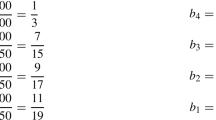Abstract
Bankruptcy problems are considered from a game theoretic point of view. Solution concepts from cooperative game theory are studied for bankruptcy games. A necessary and sufficient condition for a division rule for bankruptcy problems to be a game theoretic rule is given. A new division rule which is an adjustment of the proportional rule is given. This rule coincides with theT-value for bankruptcy games. Properties of the new rule are treated and a set of characterizing properties is given.
Zusammenfassung
In dieser Arbeit werden Bankrottprobleme von spieltheoretischer Warte aus behandelt; insbesondere werden Lösungskonzepte der kooperativen Spieltheorie für „Bankrottspiele“ untersucht. Eine notwendige und hinreichende Bedingung wird angegeben dafür, Daß eine Aufteilungsregel für Bankrottprobleme spieltheoretischer Natur ist. Ferner wird eine neue Aufteilungsregel angegeben, welche eine passende Modellierung der Proportionalitätsregel ist. Diese Regel fällt mit demτ-Wert für Bankrottspiele zusammen. Schließlich werden Eigenschaften dieser neuen Regel untersucht und eine Axiomatisierung angegeben.
Similar content being viewed by others
References
Aumann, RJ, Maschler M (1985) Game theoretic analysis of a bankruptcy problem from the Talmud. J Economic Theory 36:195–213
Banker RD (1981) Equity considerations in traditional full cost allocation practices: an axiomatic perspective. In: Moriarity S (ed) Joint cost allocations. University of Oklahama, pp 110–130
Driessen TSH, Tijs SH (1985) Theτ-value, the core and semiconvex games. Int J Game Theory 14:229–248
Gillies DB (1953) Some theorems onn-person games. PhD Thesis, Princeton University Press
Moulin H (1985) Equal or proportional division of a surplus, and other methods. Working paper, Virginia polytechnic institute and state university
O'Neill B (1982) A problem of rights arbitration from the Talmud. Math Soc Sci 2:345–371
Shapley LS (1971) Cores of convex games. Int J Game Theory 1:11–26
Tijs SH (1981) Bounds for the core andτ-value. In Moeschlin O, Pallaschke D (eds) Game theory and mathematical economics. North-Holland Publ Cie, pp 123–132
Tijs SH, Driessen TSH (1986) Extensions of solutions concepts by means of multiplicativeε-tax games. Math Soc Sci 12:9–20
Tijs SH, Lipperts FAS (1982) The hypercube and the core cover ofn-person cooperative games. Cahiers Centre D'Études Rech Opér 24:27–37
Young HP Taxation and bankruptcy. Mimeo, University of Maryland
Young HP Taxation, bankruptcy and estate allocation, Mimeo. University of Maryland
Author information
Authors and Affiliations
Rights and permissions
About this article
Cite this article
Curiel, I.J., Maschler, M. & Tijs, S.H. Bankruptcy games. Zeitschrift für Operations Research 31, A143–A159 (1987). https://doi.org/10.1007/BF02109593
Received:
Issue Date:
DOI: https://doi.org/10.1007/BF02109593




